Steve Flowers: Alabama is a republican state but U.S. is probably a democratic nation

The 2020 Presidential Election year has already begun. It usually begins on Labor Day of the year prior to the Election. However, in recent decades the parade has started early. They really are four-year caravans. They begin the day after the President is sworn in. Indeed, President Trump never shut down his campaign organization, He essentially has never stopped campaigning. He loves to campaign. He loves to entertain. That is really what he was before he was President and that is what he has been as President, an entertainer. He treats the Presidency as though it is an extension and continuation of his television game show. As long as he is the center of attention he is happy. Trump is amazingly similar to our two most colorful and prominent Alabama political icons, Big Jim Folsom and George Wallace. He is just as uninhibited and disarming as Big Jim was with the same irreverence for protocol and decorum. He is similar to Wallace in that he really likes campaigning and prefers campaigning to governing. Wallace really didn’t want to govern, he just liked running and getting elected governor. Speaking of Wallace, he liked to run for President also. He ran several times. He usually ran under some third-party banner. As he ran around the country running as a third-party state’s rights candidate, he would proclaim that there is not a dimes worth of difference in the national Democratic and Republican parties. However, even Wallace could not say that with a straight face today. Folks, there are a lot of philosophical differences in the national Republican and Democratic parties. They really should change their names to the Conservative and Liberal parties. The Republican Party is extremely conservative and the Democratic Party is very liberal. This extreme philosophy by each party is what has driven people into different political corners and is the reason for the political polarization of American politics. The electronic media and news networks have further driven and enhanced this polarization. Fox News Network is simply the network that Republicans watch. CNN and MSNBC could be and people assume they are appendages of the national Democratic Party. The CBS Stephen Colbert show is unashamedly the hate Donald Trump show. They should change the title to that name. The two-party machinery and nomination process is designed to choose a presidential contender as their nominee that is from the extreme segment of the party. This is especially true in the Democratic ranks. Therefore, the probability of a left wing socialist like Bernie Sanders or Elizabeth Warren being the nominee is likely. This does not bode well for our anomaly junior Democratic U.S. Senator Doug Jones. He will be running along with one of his liberal Democratic buddies. Jones has organized and voted lockstep with the Democrats since his arrival last year, which is what most folks who know Jones expected. He is a real national, liberal Democrat. He has always been and will always be a Democrat. In Jones’s defense, he is not a demagogue. He will not change his stripes or beliefs to get elected. That was evident with his vote against the conservative Trump Supreme Court appointee, Brett Kavanaugh. Jones was the only Southern Senator to vote against Trump. Indeed, Jones is the only Democratic Senator in the Deep South. His being on the ticket with the Democratic Presidential candidate in November 2020 in the Heart of Dixie, makes his chance of being elected slim-to-none. It would be a surprise if he gets 40% even with a ton of left-wing money pouring into the state on his behalf. Last year’s General Election proved we are a Red Republican State. One of the most Republican in the Nation. Donald Trump, or for that matter any Republican, will carry Alabama next year. Mickey Mouse would carry Alabama 60 to 40 if he were the nominee. However, Donald Duck would carry California and New York if he were the Democratic nominee. Folks, I hate to break it to you, but California and New York have more electoral votes than we do. It was just as much an anomaly that Donald Trump carried Michigan, Pennsylvania, Wisconsin and even Ohio and Florida, as it was that Doug Jones won in Alabama. As we look to the 2020 elections, it is evident that Alabama is a Republican state. However, the United States is probably a Democratic nation. See you next week. Steve Flowers is Alabama’s leading political columnist. His weekly column appears in over 60 Alabama newspapers. He served 16 years in the state legislature. Steve may be reached at www.steveflowers.us.
Steve Marshall: A republic, if we can keep it: the cost of counting illegal aliens in the U.S. census
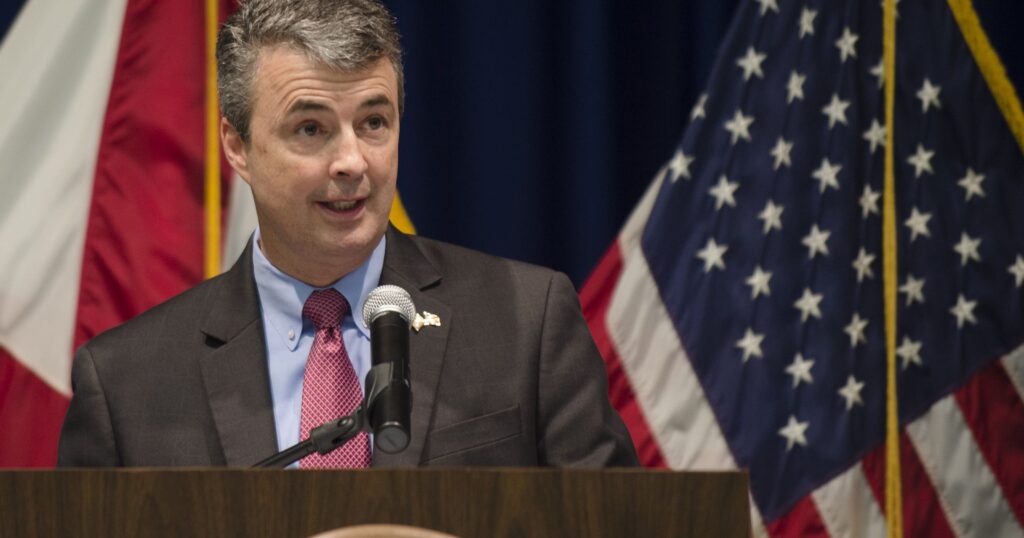
People of Alabama, Whether you are a Republican or a Democrat, liberal or conservative, you have a right to have your voice heard in the halls of Congress. The 4.8 million Americans who live in Alabama have the same right to representation as 4.8 million Americans living in Southern California or the Texas Panhandle. But that right—the right to equal representation—is quietly under attack. You see, following the 2020 census, Alabama is likely going to lose one of our seven seats in Congress. That is because Alabama has a relatively low number of illegal aliens residing here. Today, as you may be aware, it is estimated that there are at least twelve million individuals currently living in America illegally—a figure almost certainly far lower than the real number, given that it is based on self-reporting—yet it is believed that half of those individuals live in just three states. When the census forms are mailed out to homes across the country, many of those 12 million people will be counted for the purposes of determining the number of congressional districts and electoral votes that each state will be given. This means that states like California and Texas, with large illegal populations, will be given additional seats in Congress and additional votes in the Electoral College. Whatever your political leanings, ponder for a moment what this means. There is absolutely no credible argument to be made that the Constitution allows illegal aliens to vote in U.S. elections. At an even more basic level, now as a resident of Montgomery County, I can no longer vote in a local election in Marshall County, despite my frequent visits there with friends and family. Why is that so? Because our country was founded as a representative democracy. “We the people,” who control our government, control it by way of elections. When you vote in an election, you must prove that you are who you say you are, and that you live where you say you live—that is appropriate because you are choosing who will represent you and your neighbors in Washington or in Montgomery. If we accept that individuals who are in our country illegally do not enjoy the right to vote in our elections—and there is no sound legal argument that they do—then it must follow that these individuals cannot possibly be entitled to the same level of representation in government as American citizens. Otherwise, citizens of states that have more illegal aliens residing there at the time of the census are given disproportionate representation in Congress and in the Electoral College—an irrational proposition. In a state in which a large share of the population cannot vote, those who can vote count more than those who live in states where a larger share of the population is made up of American citizens. Counting large illegal-alien populations in the census unfairly takes voting power—the weight of one vote—away from American citizens based on the presence of citizens of other nations. This cannot be reconciled with the principle of equal representation enshrined in the Fourteenth Amendment to the Constitution. Last year, my office filed suit against several federal agencies—including the U.S. Census Bureau—in an effort to guard against our looming loss of representation due to our low illegal-alien population. Recently, we succeeded against an attempt by the federal government to have the suit dismissed. Still, we have many more battles ahead. And we will fight them all, up to the hilt, because our cause is just. We will defend the right of the people of Alabama to equal representation. Steve Marshall, Alabama Attorney General
Brett Kavanaugh bump? GOP fights for new energy as vote nears

On the brink of a political gender war, President Donald Trump‘s Republican Party is threatening to erode Democrats’ enthusiasm advantage as the fiery debate over his Supreme Court nominee enters its final phase. Political strategists in both parties suggest the GOP’s enthusiastic embrace of Brett Kavanaugh despite multiple allegations of sexual misconduct may have shifted the political landscape — at least temporarily — by injecting new energy into the most passionate Republican voters a month before the election. Trump’s aggressive defense of Kavanaugh — and more recent attacks against his female accuser — have resonated particularly with white working-class men, who are a shrinking voting bloc nationally but remain a critical segment of Trump’s political base. For now, many men apparently agree with Trump’s warning that the surge in women speaking out against sexual violence in the #MeToo era has created “a very scary time” for men in America. “Democrats have been trying to destroy Judge Brett Kavanaugh since the very first second he was announced,” Trump declared as he rallied voters in Minnesota on Thursday night. He added: “What they’re putting him through and his family is incredible.” Energy is everything in midterm elections, which typically draw fewer eligible voters to the polls. And through the first 21 months of the Trump era, Democrats have claimed an undisputed enthusiasm advantage — as evidenced by a slate of special election victories and fundraising successes. Yet even a small erosion in the so-called enthusiasm gap could make a big difference in the Democratic Party’s high-stakes push to wrest control of Congress from the GOP. The effect is most visible in Republican-leaning states where vulnerable Democratic senators are running for re-election. Public and private polling in recent days has shifted in the GOP candidate’s favor in West Virginia, Missouri, Indiana and North Dakota. The Kavanaugh debate “is making the two groups of people who are already mad at each other in America even madder. To me, the question is, who is maddest?” said Gary Pearce, a veteran North Carolina Democratic strategist. Just as Trump benefited from opposition to Hillary Clinton in his 2016 election, the GOP could benefit from opposition to the Democratic Party’s handling of Kavanaugh this midterm season. “This may be energizing the right — especially people who don’t like Trump and may not have been motivated to vote,” Pearce said. “This is the substitute for Hillary.” The Supreme Court clash has already attracted a surge of new campaign cash for both parties. The Republican National Committee and its associated groups raised more than $3 million in digital donations this past weekend, the most it’s ever raised online, according to GOP spokeswoman Cassie Smedile. And last Sunday was the GOP’s highest single-day online fundraising haul. The GOP says the fundraising surge is fueled by anger over how allegations of sexual misconduct against Kavanaugh have played out. On the other side, the online Democratic fundraising portal ActBlue pulled in $25 million in just two days, while Emily’s List, a group that aims to elect more Democratic women, also set a record for online fundraising. Trump and his lieutenants on Capitol Hill tried to stoke that same anger on Thursday as they outlined an aggressive timeline for the Kavanaugh confirmation. A round of Senate voting is expected Friday, with the final vote likely Saturday. Senate Majority Leader Mitch McConnell said that an FBI supplemental background investigation didn’t corroborate any of the allegations against the Supreme Court nominee. The Kentucky Republican said senators wouldn’t be “hoodwinked” by those who have tried to “smear” Kavanaugh’s reputation. “This is a search and destroy mission,” the second-ranking Senate Republican, Sen. John Cornyn, added. The GOP’s support of Kavanaugh puts the party at odds with the rising #MeToo movement that has empowered women across America to share their stories of sexual violence. The movement has triggered the downfall of powerful men in media, sports and politics — Republicans and Democrats alike. “It’s a very scary time for young men,” Trump said this week. A day later, he mocked Kavanaugh’s accuser’s memory of the alleged sexual assault. Many women, backed by liberal men, have been outraged by Trump’s comments. “The idea that it’s a terrible time to be a young, white guy is completely absurd,” said Florida-based Democratic strategist Steve Schale. He noted, however, there is “some evidence that the Kavanaugh stuff is galvanizing Republicans, particularly Republican men.” “It’s coming at a price,” Schale added. “We’re seeing Republican women throw their hands up.” Indeed, while Trump often states, falsely, that he won the women’s vote in 2016, Democrats have enjoyed an advantage with women for most of the last three decades. Political strategist Matthew Dowd, a former Republican who has criticized Trump, said it’s unclear so far whether GOP energy behind Kavanaugh represents “some men on social media” or a “movement.” “I’ve always been a believer that the most motivating factor in these elections is who is the angriest,” Dowd said. “Whoever loses is going to be the angriest.” While Kavanaugh may be helping Republican candidates in deep-red states, a Quinnipiac University poll released this week shows that opposition to Kavanaugh nationally is actually growing, as is the gender gap. Women overall oppose the confirmation, 55 percent to 37 percent, while men support it 49 percent to 40 percent, Quinnipiac found. The Trump White House is expected to intensify its support for Kavanaugh as the final vote approaches. “You can feel the energy both for the president and for his nominee in Brett Kavanaugh,” Trump spokeswoman Sarah Sanders told Fox News. “People are outraged at the way that the Democrats have totally made this process into a partisan battle and they’ve created something that should never have happened.” She continued: “And I think the message is very clear: Dems, you made a mistake here and it’s going to show up in November.” Republished with permission from the Associated Press.
Todd Stacy: A turning point for Alabama Republicans’ direction, identity

Don’t misinterpret Democratic Senator Doug Jones‘s recent election win as a paradigm shift in Alabama politics. The Republican Party still holds sway in the state: all statewide constitutional offices are held by Republicans; all nine Supreme Court justices are Republicans; and both chambers of the state legislature are ruled by significant Republican majorities. The GOP’s dominance in Alabama isn’t likely to abate any time soon given the state’s deep conservative beliefs. However, the failure to elect a Republican to fill Jeff Sessions’ Senate seat is exposing some internal disagreements as to the party’s direction and identity in the years ahead, and a turning point in that struggle might come as soon as next week when the ALGOP State Executive Committee meets in Montgomery. Disagreements between different factions in the Republican Party are nothing new. There has always been a struggle for influence between fiscal and social conservatives, defense hawks and libertarians, and steady-as-she-goes establishment Republicans and burn-it-to-the-ground tea party types. Tension between those of differing beliefs within the “big tent” is natural and probably healthy. But, disagreement over the Roy Moore election debacle is threatening to turn into disunion. A few in the mostly-older, activist faction are still bitter over the loss and focusing their ire on U.S. Sen. Richard Shelby, who said he could not vote for Moore and would write-in a “distinguished Republican” after multiple allegations of sexual abuse and misconduct by Moore were reported by The Washington Post. A group led by former Cleburne County GOP Chairman Tim Sprayberry is floating a party resolution condemning Shelby for his stance and recently joined with a Texas investor to run robocalls critical of Alabama’s senior senator. Most believe the resolution will go nowhere given Shelby’s broad support throughout Alabama and immense influence in Washington, to say nothing of how out of touch Republicans would look doubling down on the kind of politics that help cost them the Senate seat in the first place. Many conservatives are thanking Shelby for his principled stand, understanding that the election loss, while disappointing in the short term, is probably in the best interest of the party over the long term because it can be rid of Moore’s political baggage. Still, Sprayberry isn’t giving up. He’s attempting to whip up support for the resolution ahead of the State Executive Committee meeting on February 24th. The ALGOP now faces a difficult choice. If it appeases the pro-Moore faction’s desire to criticize Shelby, it will alienate two groups it can ill afford to do without: those who invest in the Republican party and those who are its future. Big benefactors in Republican politics have not been shy about pushing back against the anti-Shelby resolution. Jimmy Rane, founder, president and CEO of Great Southern Wood called Shelby “one of Alabama’s greatest assets” and publicly asked “why is the Alabama Republican Party doing nothing to help maximize Senator Shelby’s effectiveness” as likely incoming chairman of the Senate Appropriations Committee. “We ought to commend the courage of our senior Senator and enthusiastically support him as he prepares to pick up the gavel of the Appropriations Committee of the United State Senate,” he wrote. Rane knows what he’s talking about. Most people don’t realize that before he built one of Alabama’s most iconic and successful companies, Rane once worked as a congressional staffer on Capitol Hill. He understands how Washington works and what awesome benefits Alabama could realize with Shelby assuming the Appropriations chairmanship. Of course, now Rane is the state’s wealthiest man and a major contributor to Republican candidates and causes. For him to publicly and specifically call on the ALGOP to drop this resolution is hugely significant. The future of the party is also pushing back. Young Republicans by and large disagree with the idea of censuring Shelby for his stance on Moore – a stance many of its membership held themselves. The 40-and-under Young Republican Federation of Alabama withdrew its support for Roy Moore in November, and the Birmingham Young Republicans voted to censure the Senate candidate saying it was “committed to protecting women and children from similar acts of sexual misconduct.” Jackie Curtiss, state chair of the Young Republicans, said the ALGOP should be focused on winning future elections, not haggling over the last one. “Instead of learning lessons from the Doug Jones win, some would rather go to infighting and assigning blame,” she said. “You have a handful of people in the party who are stirring up controversy, but there are also many of us who want to defend Senator Shelby and make sure the party moves forward. Young Republicans want the party to be unified because that’s our best chance to win the seat back in 2020.” The funders and the future of the Republican Party want to move past this dust up and focus on the upcoming 2018 elections. It looks like the ALGOP State Executive Committee will decide whether that can happen when it meets next week. ••• Todd Stacy is the publisher of the Alabama Daily News, a news aggregation site. His 15-year career in Alabama politics spanned from the State House in Montgomery to Capitol Hill in Washington, D.C. and now informs his political news analysis at www.ALDailyNews.com.
Steve Flowers: Jim Martin, father of the modern Republican Party in Alabama

Jim Martin passed away recently in Gadsden at 99 years old. His beloved wife of 70 years, Pat, was by his side. He was a true Christian gentleman. Jim was one of the Fathers of the modern Republican Party in the South. In 1962, John Kennedy was President. Camelot was in full bloom. The Congress was controlled by Democrats only because the South was solidly Democratic. The southern bloc of senators and congressmen were all Democrats. Because of their enormous seniority, they controlled both houses of Congress. The issue of Civil Rights was a tempest set to blow off the Capitol dome. Kennedy was under intense pressure to pass major Civil Rights legislation. However, he was up against a stonewall to get it passed the powerful bloc of southern senators. Race was the only issue in the South, especially in Alabama. George Wallace was riding the race issue to the Governor’s office for his first term. The white southern voter was determined to stand firm against integration and was poised to cast their vote for the most ardent segregationists on the ballot. Our Congressional delegation was Democratic, all eight Congressmen and both Senators. Our tandem of John Sparkman and Lister Hill had a combined 40-years of service. Lister Hill had gone to the U.S. Senate in 1938. He had served four six-year terms and had become a national celebrity in his 24 years in the Senate. He was up for election to his fifth six-year term. It was expected to be a coronation. He was reserved, aristocratic, and almost felt as if he was above campaigning. Hill was also soft on the race issue. He was a progressive who refused race-bait. Out of nowhere a handsome, articulate, young Gadsden businessman, Jim Martin, appeared on the scene. Martin was 42, a decorated World War II officer who fought with Patton’s 3rd Army in Europe. He entered as a private and became an integral part of Patton’s team, rising to the rank of Major. After the war he went to work for Amoco Oil and married a Miss Alabama – Pat McDaniel from Clanton. They then settled in Gadsden and he bought an oil distributorship and became successful in business. He was a business Republican and became active in the State Chamber of Commerce. When the State Chamber Board went to Washington to visit the Congressional delegation, they were treated rudely by our Democratic delegates who were still voting their progressive New Deal, pro union philosophy. Martin left Washington and decided that Alabama at least needed a two party system and that he would be the sacrificial lamb to take on the venerable Lister Hill as the Republican nominee for the U.S. Senate. Martin got the nomination in a convention and the David vs. Goliath race was on. By late summer the Big City newspapers could feel that Martin had some momentum. He was being perceived as the conservative and Hill as the liberal. Every Alabama courthouse was Democratic, all sheriffs, Probate Judges, and statewide elected officials. It was hard to imagine that the tradition of voting Democratic would change, but the winds of segregation were strong. When the votes were counted in November of 1962, Martin had pulled off the biggest upset in the nation. NBC’s team of Huntley and Brinkley reported the phenomenon on the nightly news. Republican President, Eisenhower, called Martin to congratulate him. However, things were happening in rural North Alabama. Martin had won by 6,000 votes but three days later, mysterious boxes appeared with just enough votes to give Hill the belated victory. The entire country and most Alabamians knew that Jim Martin had been counted out. Jim Martin would have been the first Republican Senator from the South in a century. Some people speculate that he would have been the vice-presidential candidate with Nixon in 1968. Regardless, he was the John the Baptist of the Southern Republican sweep of 1964, and father of the modern Republican Party in Alabama. That 1962 Senate race was a precursor of what was to come two years later. Jim Martin was one-of-five Republicans swept into Congress in the 1964 Goldwater landslide. He probably would have won the U.S. Senate seat of John Sparkman. However, he chose to run for governor against Lurleen Wallace. In 1987 Martin became Commissioner of the Alabama Department of Conservation and Natural Resources. As commissioner, Martin helped create the Forever Wild land preservation program. Jim Martin has a special place in Alabama political history. See you next week. ••• Steve Flowers is Alabama’s leading political columnist. His weekly column appears in over 60 Alabama newspapers. He served 16 years in the state legislature. Steve may be reached at www.steveflowers.us.
Alabama GOP stands behind Roy Moore amid assault allegations
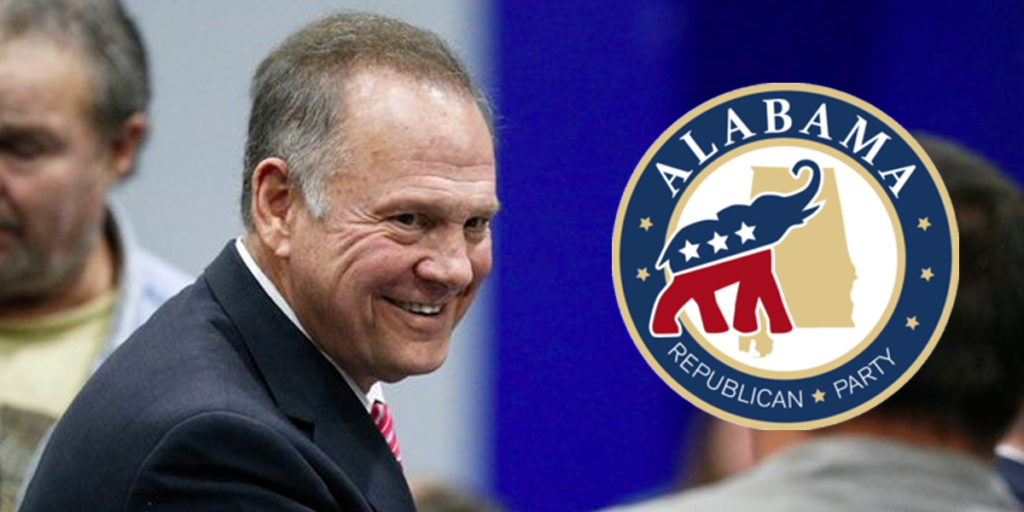
The Alabama Republican Party (ALGOP) Thursday evening said it is standing behind the party’s Senate nominee Roy Moore as they offered their continued support ahead of the Dec. 12 general election. Moore has been under fire since The Washington Post published an explosive report last Thursday afternoon with the accounts of four women who claim he sexually pursued them when he was in his 30s and they were in their teens. As of Thursday evening, a total of nine women have levied accusations against Moore. The news has caused rapid fallout from dozens within the Republican Party who have called on him to withdraw his name from next month’s special election if the allegations are true, but the ALGOP is breaking rank with the national party standing behind the former Alabama Chief Justice. “The ALGOP Steering Committee supports Judge Roy Moore as our nominee and trusts the voters as they make the ultimate decision in this crucial race,” said Chair of the Alabama Republican Party, Terry Lathan, in a statement. “Judge Moore has vehemently denied the allegations made against him. He deserves to be presumed innocent of the accusations unless proven otherwise. He will continue to take his case straight to the people of Alabama.” According to Lathan, ALGOP Steering Committee, comprised of 21 members, met Wednesday evening to discuss the situation surrounding Moore. “We are very grateful for the multitudes that have reached out to us with support and prayers. We ask God to guide us, politically and personally, with His mighty strength and wisdom. In turn, we also pray that justice and truth will prevail for all involved in this situation,” Lathan concluded. Moore’s campaign Chairman Bill Armistead responded to the ALGOP’s statement of support on behalf of the campaign. “I appreciate Chairman Terry Lathan and the Alabama Republican Party standing strong behind Judge Moore,” said Armistead. “As Chairman Lathan alluded, there are sharp policy differences between Judge Moore and the Democratic nominee. Judge Moore will work closely with President Trump to rebuild a strong military, confirm strict constitutionalists to the courts, and reform and simplify the tax code, while the Democratic nominee supports Obamacare, partial-birth abortion and far-left liberals on the Supreme Court.” “The political establishment and the national media have put a bullseye on Judge Moore because he’s a conservative outsider who will go to Washington to fight for our values, but the voters of Alabama – the people who know him best – aren’t fooled by these tricks and lies. Judge Moore will spend the next three weeks traveling the state and speaking directly to the voters about job growth, tax reform, rebuilding the military, and stopping the overreach of liberal judges. ”
Bob Corker’s attacks on Donald Trump highlight broader concerns in GOP
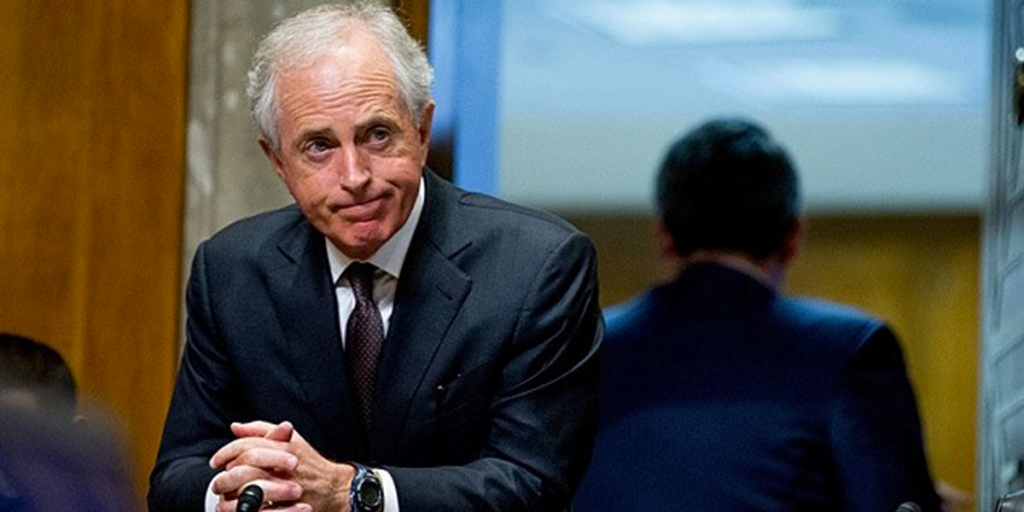
Sen. Bob Corker is hardly the only Republican lawmaker raising dark concerns about harm President Donald Trump might cause the U.S. and the world. But he’s one of the few willing to air those worries in public. Most GOP senators were silent Monday, a day after Corker charged that the White House was an “adult day care” and Trump could set the nation “on the path to World War III.” The only senator who publicly hinted at similar concerns was Iowa Sen. Chuck Grassley, who said both Trump and Corker should “cool it.” “And I think it would help if the president would be the first to cool it,” he added. Tennessee’s Corker, with his Twitter broadsides and an explosive weekend New York Times interview, gave voice to concerns that circulate widely on Capitol Hill about an unpredictable president whose tendency to personalize every issue creates risks for the GOP agenda. But Trump’s enduring popularity with a segment of the GOP base serves as a political muzzle that keeps most elected Republicans from saying anything similar, even those who believe it to be true. Grassley, who won’t be up for re-election until 2022, responded bluntly when asked about the situation. “I don’t see how it’s productive, and I think that two words would kind of answer your question from my point of view: Cool it,” he said. “I think it would be better if we stuck to the issues and leave personalities out of it.” A few other Republican senators who provided public views Monday avoided aligning themselves with Corker. “You’ll have to ask Sen. Corker what led him to make that statement. I haven’t made that statement,” Sen. Marco Rubio of Florida said of Corker’s suggestion that Trump could take the country into another world war. Sen. Jeff Flake has been outspoken in his criticism of Trump, who’s attacked him in return. But the Arizona Republican was restrained during a joint interview with Rubio after a re-election fundraiser in Scottsdale. “Any of us who’ve worked with Sen. Corker know that he speaks his mind,” Flake said, demurring on whether he shares Corker’s view that the White House has become an “adult day care center.” “I agree with him on some things, I’ve supported a lot of his agenda, some things I’ve disagreed with and continue to do so,” Flake said of Trump. The Associated Press sought to contact all 52 Republican senators Monday for their response to Corker’s comments and ask whether they believe Trump is fit for office, a question Corker declined to answer in the Times interview. With the Senate on recess this week and many offices closed for Columbus Day, the inquiries elicited few responses, and those who did largely declined comment. Corker offered no solution to the problem he identified so graphically. Trump is the president, and few doubt that he will remain so, despite constitutional provisions for impeachment or for the vice president to take over if the commander in chief cannot discharge his duties. Moreover, Republicans’ political fortunes remain tied to the president’s. They need his signature if they are to rescue a flagging agenda and pass a tax overhaul, a goal many believe is imperative if the GOP is to retain control of Congress in next year’s midterm elections. So unlike Corker, who recently announced he is not running for re-election in Tennessee, even GOP Trump critics will continue to mute their concerns about his behavior and try to work with the administration. “Sen. Corker, who’s been a strong supporter of the president in the past, is essentially saying the emperor has no clothes,” said Michael Steel, who served as spokesman to former House Speaker John Boehner of Ohio. But, Steel added: “The president was elected under our constitutional system and that’s where we stand. Congressional leaders are going to continue concentrating on doing everything they can to get big things done for the American people, and they hope to have as much support from the administration as possible.” Senate Majority Leader Mitch McConnell of Kentucky, the target of Trump attacks after the Senate’s failure to pass health care legislation, didn’t directly answer when asked at an event in Hazard, Kentucky, whether he shared Corker’s sentiments. “Sen. Corker is a valuable member of the Senate Republican caucus and he’s also on the Budget Committee and a particularly important player as we move to the floor on the budget next week,” McConnell said. His comments underscored what has frustrated Republicans most about the Trump-Corker feud, which burst open Sunday when Trump began tweeting, inaccurately, that Corker had begged for his endorsement and decided not to run for re-election when Trump turned him down. Trump will need Corker if he is to get big tax changes through the Senate, where the narrow GOP majority was unable to pass McConnell’s efforts to repeal the Affordable Care Act. And Corker also figures to be a key player if Trump moves as expected to unwind the Iran nuclear deal. Vice President Mike Pence, in a statement that never mentioned Corker, praised the president for “achieving real results on the international stage. While critics engage in empty rhetoric and baseless attacks.” Republicans do frequently complain about Trump’s attacks on fellow Republicans like McConnell, his failure to stay focused on his legislative agenda and his tendency to make demands on Congress and then blame lawmakers for poor results. But those GOP comments are nothing like Corker’s apocalyptic statements. For House Republicans, who face voters every two years and largely represent conservative districts where support for the president remains strong, there’s even less incentive to turn against the commander in chief. Sixty-eight percent of Republican voters approve of Trump, though that’s down from 80 percent in March, according to a recent AP-NORC poll. Rep. Mark Meadows of North Carolina, chairman of the conservative House Freedom Caucus, criticized Corker, saying he finds “those type of comments to not be appropriate especially coming from the chairman of the Foreign Relations Committee,
Luther Strange claims he’s the “clear choice” in Sept’s GOP Senate runoff

Sen. Luther Strange has begun to draw battle lines in next month’s fight the GOP nomination for Alabama’s U.S. Senate, setting the stage for a showdown between him and opponent Roy Moore. In a Tuesday press release, Strange threw the gauntlet, calling the former Alabama Chief Justice, Moore, a hypocrite “who has spent 40 years putting himself and his ambition ahead of Alabamians.” The release marks the campaign’s first direct attack against Moore, who led Strange by 25,000 votes in the August 15 primary. Neither candidate earned enough votes to become the Party’s outright nominee, thus sending the race to a runoff scheduled for Sept. 26. Strange pointed out a series of six “facts” in support of his candidacy and against Moore: FACT: As Attorney General, Big Luther created the Special Prosecution Division and successfully convicted corrupt officials – included the Republican State Speaker of the House – who were removed from office and/or jailed.[i] FACT: Because of his success draining the Montgomery swamp, corrupt politicians tried to shut Big Luther down, gutting the Attorney General’s Office (AGO) budget and passing a law that would have given legislators the ability to block specific AGO operations and investigations.[ii] FACT: Big Luther opposes career politicians and supports term limits. FACT: Roy Moore has been running for office since he first ran for an Etowah County circuit judge seat in 1982 as a Democrat. FACT: Roy Moore fought for pay increases for politicians while courts had to shut down because of lack of funding.[iii] FACT: Roy Moore has made a career out of profiting off of public service and sticking tax payers with the bill. [iv] He also deemed himself as “the only candidate in this race that has a record of delivering conservative reform and protecting rule of law,” touting President Donald Trump‘s endorsement.
GOP insurgents claim Donald Trump mantle, spell trouble for party
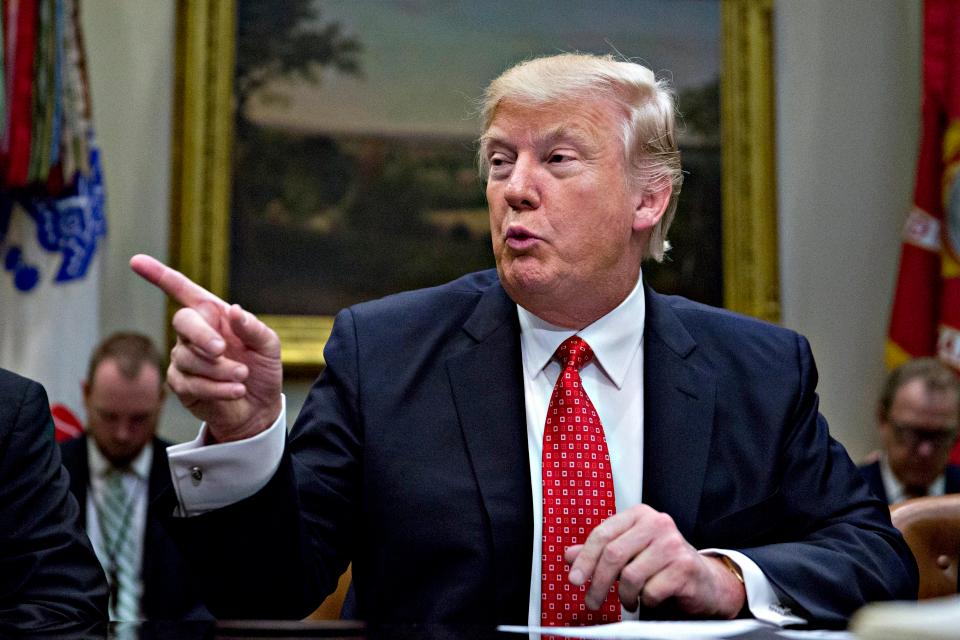
Republicans face a problem as they try to defend a slim majority in the Senate and win races elsewhere: Insurgent primary candidates are trying to lay claim to President Donald Trump‘s mantle, and knock out the establishment’s choices. The latest case is in Nevada, where endangered GOP incumbent Sen. Dean Heller drew a challenge Tuesday from businessman and repeat failed candidate Danny Tarkanian, who announced his bid in an early morning Fox News Channel appearance seemingly aimed at an audience of one: the president himself. “We’re never going to make America great again unless we have senators in office that fully support President Trump and his America-first agenda,” Tarkanian said, criticizing Heller as “one of the first never-Trumpers in Nevada” and arguing he had obstructed Trump’s agenda in Congress. Heller opposed early versions of Trump-backed health care legislation in the Senate before voting for a final version that failed anyway. His campaign spokesman, Tommy Ferraro, dismissed Tarkanian as a “perennial candidate.” The National Republican Senatorial Committee, which is the official Senate GOP campaign arm, quickly announced its support for Heller, and a super PAC backed by Majority Leader Mitch McConnell, R-Ky., committed to spending what it takes to support him and other GOP incumbents. The dynamic mirrors longstanding clashes between the GOP’s establishment and activist wings, which played out disastrously in 2010 and 2012 when hard-core conservatives won Senate primaries but went on to lose to Democrats. McConnell and his allies vowed never to let that happen again and have subsequently intervened in primaries when necessary to produce candidates who could win. The X factor now is the appeal Trump may hold to Republican primary voters – and what Trump himself will do. The president offered one clue Tuesday night, backing the establishment candidate in next week’s GOP Senate special election primary in Alabama, hours after an Associated Press story noted the absence so far of a presidential endorsement in the race. “Senator Luther Strange has done a great job representing the people of the Great State of Alabama. He has my complete and total endorsement!” the president wrote, bypassing a firebrand House conservative, Mo Brooks, and an evangelical former state chief justice, Roy Moore, in favor of the appointed senator strongly backed by McConnell. The candidates are fighting over the seat previously held by now-Attorney General Jeff Sessions. But whether Heller will get the presidential seal of approval in his primary is far less clear, and he is not alone. Next door in Arizona, GOP incumbent Sen. Jeff Flake, another Trump skeptic during last year’s campaign, faces at least one challenge from the right in conservative Kelli Ward, who repeatedly denounces Flake while praising Trump. In each case, to their annoyance, establishment-aligned Republicans face the prospect of spending millions to protect an incumbent from a challenger who might have a tough time getting out of the general election. Republicans hold a 52-48 Senate majority and are playing offense against Democratic incumbents in 10 states Trump won. “It’s a critical time to make sure that Republican members know, when they’re casting tough votes, that we’ll have their backs,” said Steven Law, a former McConnell chief of staff who heads the Senate Leadership Fund, in describing the decision to come in with millions to back Strange in Alabama. Until Trump weighed in with his endorsement late Tuesday, the Alabama race had underscored questions about the role the president would play in Senate primaries. A former GOP Senate campaign official with knowledge of the situation said the NRSC has sought help from the Trump White House on Senate races but those requests went unanswered under the leadership of recently ousted Chief of Staff Reince Priebus, leading to widespread frustration. The former campaign official spoke on condition of anonymity to discuss internal party matters. While Trump and Vice President Mike Pence have said they want to increase the Republican majorities in the House and Senate, the White House’s approach to contentious primaries isn’t clear yet. And Trump has already worked against McConnell’s goals, ignoring his pleas not to appoint former Montana Rep. Ryan Zinke, a likely Senate candidate, as Interior secretary, while boosting endangered Democratic Sens. Heidi Heitkamp of North Dakota and Joe Manchin of West Virginia by hosting them at Trump Tower. As for Heller, he is already walking the Trump tightrope. Heller’s initial denunciation of a Senate plan to repeal and replace Obamacare drew the ire of a political nonprofit promoting Trump’s agenda. America First Policies tied Heller to House Minority Leader Nancy Pelosi, D-Calif., in a social media push and threatened to spend more than $1 million trashing him on television and radio on his home turf. McConnell called the group’s attacks “beyond stupid.” In addition to the health care episode, Heller in 2015 said he was donating Trump’s previous campaign contributions to charity – a move he announced after Trump came under fire for characterizing some illegal immigrants from Mexico as rapists. For a president with a famously long memory for slights, Heller may have little hope of getting back into his good graces. Republished with permission of The Associated Press.
GOP voters blame Congress, not Donald Trump, for lack of progress
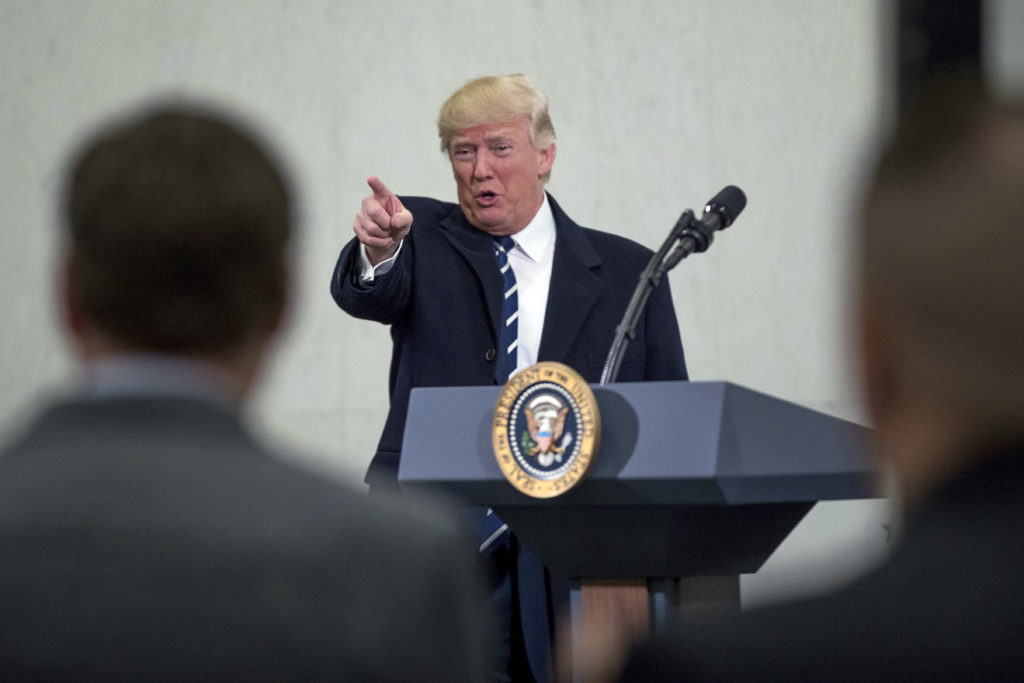
In firm control of the federal government, President Donald Trump and his Republican Party have so far failed to deliver on core campaign promises on health care, taxes and infrastructure. But in New York’s Trump Tower cafe, the Gentry family blames Congress, not the president. Like many Trump voters across America, the Alabama couple, vacationing last week with their three children, says they are deeply frustrated with the president’s GOP allies, faulting them for derailing Trump’s plans. As the family of five lunched in Trump Tower, Sheila Gentry offered a pointed message to those concerned with the GOP’s ability to govern five months into the Trump presidency. “Shut up. Get on board. And let’s give President Trump the benefit of the doubt. It takes a while,” said the 46-year-old nursing educator from Section, Alabama. “They just need a good whoopin’,” said her husband, Travis Gentry, a 48-year-old engineer, likening congressional infighting to unruly kids in the back seat of the car. As Washington Republicans decry Trump’s latest round of Twitter attacks, Republicans on the ground from New York to Louisiana to Iowa continue to stand by the president and his unorthodox leadership style. For now at least, rank-and-file Republicans are far more willing to blame the GOP-led Congress for their party’s lack of progress, sending an early warning sign as the GOP looks to preserve its House and Senate majorities in next year’s midterm elections. Inside and outside the Beltway surrounding the nation’s capital, Republicans worry their party could pay a steep political price unless they show significant progress on their years-long promise to repeal and replace Democrat Barack Obama‘s health care law. Even more disturbing, some say, is the Republican Party’s nascent struggle to overhaul the nation’s tax system, never mind Trump’s unfulfilled vows to repair roads and bridges across America and build a massive border wall. “It’s a problem for Republicans, who were put in place to fix this stuff. If you can’t fix it, I need someone who can,” said Ernie Rudolph, a 72-year-old cybersecurity executive from suburban Des Moines, Iowa. There is no easy path forward for the Republican Party. The nonpartisan Congressional Budget Office predicts that health care legislation backed by House and Senate Republican leaders – and favored by Trump – would ultimately leave more than 20 million additional Americans without health care, while enacting deep cuts to Medicaid and other programs that address the opioid epidemic. In some cases, the plans would most hurt Trump’s most passionate supporters. Just 17 percent of Americans support the Senate’s health care plan, according to a poll released last week, making it one of the least popular major legislative proposals in history. The president on Friday injected new uncertainty into the debate by urging congressional Republicans simply to repeal Obama’s health care law “immediately” while crafting a replacement plan later, which would leave tens of millions of Americans without health care with no clear solution. That shift came a day after several Republicans in Congress condemned Trump’s personal Twitter attack against MSNBC hosts Mika Brzezinski and Joe Scarborough, which was viewed across Washington as an unwanted distraction in the midst of a sensitive policy debate. Trump’s nationwide approval rating hovered below 40 percent in Gallup’s weekly tracking survey, even before the tweet. At the same time, just one in four voters approve of Republicans in Congress, Quinnipiac University found. Democrats, meanwhile, report sustained energy on the ground in swing districts where Republicans face tough re-election challenges. Democrats need to flip 24 seats to win the House majority next fall, a goal that operatives in both parties see as increasingly possible as the GOP struggles to govern. A former Obama administration national security aide, Andy Kim, is among a large class of fresh Democratic recruits. “People are fired up,” said Kim, who’s challenging Rep. Tom MacArthur, R-N.J. “It’s not just about the health care bill. It’s not just about Trump. … They’re concerned about the ability of this government to put together any credible legislation going forward.” Republicans are also concerned. In Iowa’s Adair County, GOP Chairman Ryan Frederick fears that Republican voters will begin to lose confidence in their party’s plans for taxes, infrastructure and immigration should the health care overhaul fail. “Everyone I know looks at trying to get Obamacare repealed and says, ‘If we’re making this much of a pig’s breakfast out of that, what are we going to do with tax reform?’” Frederick said. “We’ve dreamed of killing Obamacare for seven years. And we have the House, the Senate and the presidency, and we can’t do it?” he continued. “What’s the deal, guys?” Louisiana Republican Party Chairman Roger Villere bemoans “factionalism” in his party. Intraparty divisions are holding up health care, he says, which in turn keeps the GOP-led government from tackling other priorities. He’s looking to Trump for leadership. “He’s the ultimate negotiator,” Villere said. “We’ll see how good he is.” Back in Trump Tower, Sheila Gentry conceded that Trump’s tweets sometimes make her cringe, but she still has confidence in her president. She can’t say the same for congressional Republicans. “The Republicans who are in there now that aren’t being very supportive, they’re going to find themselves without a job soon if they don’t step it up,” she said. Republished with permission of The Associated Press.
Analysis: Dem loss in Georgia underscores party challenges
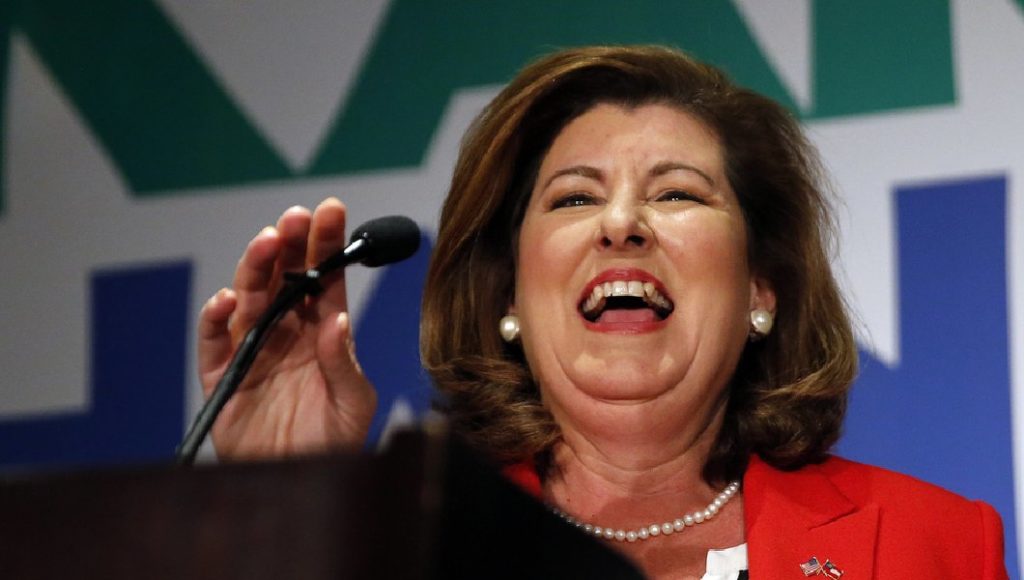
Republicans just got a big argument for sticking with President Donald Trump and pushing forward with dismantling former President Barack Obama‘s health law. And Democrats are struggling to translate the energy of their core supporters into actual election victories. Tuesday night’s outcome in a special House race in Georgia was a triumph for the GOP, and the most recent and devastating illustration of the Democrats’ problems – from a weak bench and recruiting problems to divisions about what the party stands for today. Instead of a win or even a razor-thin loss by Democrat Jon Ossoff that many had expected, Republican Karen Handel ended up winning by a relatively comfortable 4 percentage point margin in the wealthy suburban Atlanta district previously held by Health and Human Services Secretary Tom Price. That followed another recent Democratic disappointment in Montana, where the Republican candidate won even after last-minute assault charges, and an earlier loss for the Democrats in Kansas. Rep. Rick Nolan, D-Minn., said Democrats are not as good on delivering a winning message to voters as they should be. “Harry Truman said it best, if you want to be Republican-lite, people will vote for the real thing every time,” Nolan told reporters Wednesday. Indeed the best news Democrats got Tuesday night was that a different special House race, in South Carolina, ended up closer than the Georgia contest even though it had drawn little national attention. Republican Ralph Norman beat Democrat Archie Parnell by around 3 percentage points in South Carolina, closer than expected and a warning sign to the GOP not to take any seat for granted. But for Democrats, having failed to unseat a Republican in four special House elections in a row despite an extremely energized base, it’s now a time for soul-searching – and finger-pointing. Ossoff ran a careful campaign and shied away from talking about Trump, and some groups on the left wasted no time in insisting that Democrats must draw brighter contrasts with the GOP. “Defeating Republicans in districts that they have traditionally held requires doing something drastically different than establishment Democrats have done before – specifically, running on a bold progressive vision and investing heavily in direct voter contact,” said Jim Dean, chair of Democracy for America. The Georgia race was the most expensive House race in history, with many millions spent on both sides. The fact that that level of investment failed to pay off with a win against a Republican candidate widely viewed as uninspiring left Democrats frustrated and dispirited heading into the 2018 midterm elections. Democrats will need to pick up 24 House seats to take back the majority. The outcome “better be a wake-up call for Democrats – business as usual isn’t working,” Rep. Seth Moulton, D-Mass., said on Twitter. “Time to stop rehashing 2016 and talk about the future.” House Democratic leaders tried to play down the loss ahead of time, pointing out that the Georgia race took place on GOP-friendly terrain, as did the other recent special elections. Rep. Joe Crowley of New York, chairman of the House Democratic Caucus, said that there are 71 districts that will be more favorable for Democrats to contest than the one in Georgia. Democrats face gerrymandered districts after the last census combined with Trump selecting lawmakers for his administration from districts the GOP should hold. “They pick people in safe and tough districts for Democrats to win,” Crowley said Wednesday. But for Republicans from the president on down, it was time to celebrate. Trump sent supporters a text message crowing, “Congrats to Karen Handel on a HUGE win in GA! Democrats lose again (0-4). Total disarray. The MAGA Mandate is stronger than ever. BIG LEAGUE.” As the results rolled in Tuesday, AshLee Strong, spokeswoman to House Speaker Paul Ryan, mused over Twitter, “Remember when they told us we’d be punished in the special elexs for following through on our promise to #RepealAndReplace #obamacare?” Indeed the string of special election wins, especially in Georgia, sent a powerful message to Republicans that they must be doing something right, even though Trump’s approval ratings are low by historical standards and the GOP has yet to notch a single major legislative accomplishment on Capitol Hill. Far from rethinking their support for Trump or their plans to undo former President Barack Obama’s health care law, Republicans seem likely to stay the course. “It shows us that people are wanting some of the things we’ve been talking about, President Trump’s been talking about – less government, more power to the folks. Tax reform. That’s the kind of things we’ve got to get done. They believe in us being better able to do it rather than the other side,” said Rep. Roger Williams, R-Texas. And as for the Democrats, they, clearly, are doing something wrong. What exactly it is, and whether they can fix it, will be debated in the weeks and months ahead. Republished with permission of The Associated Press.
Martin Dyckman: It’s always about the money
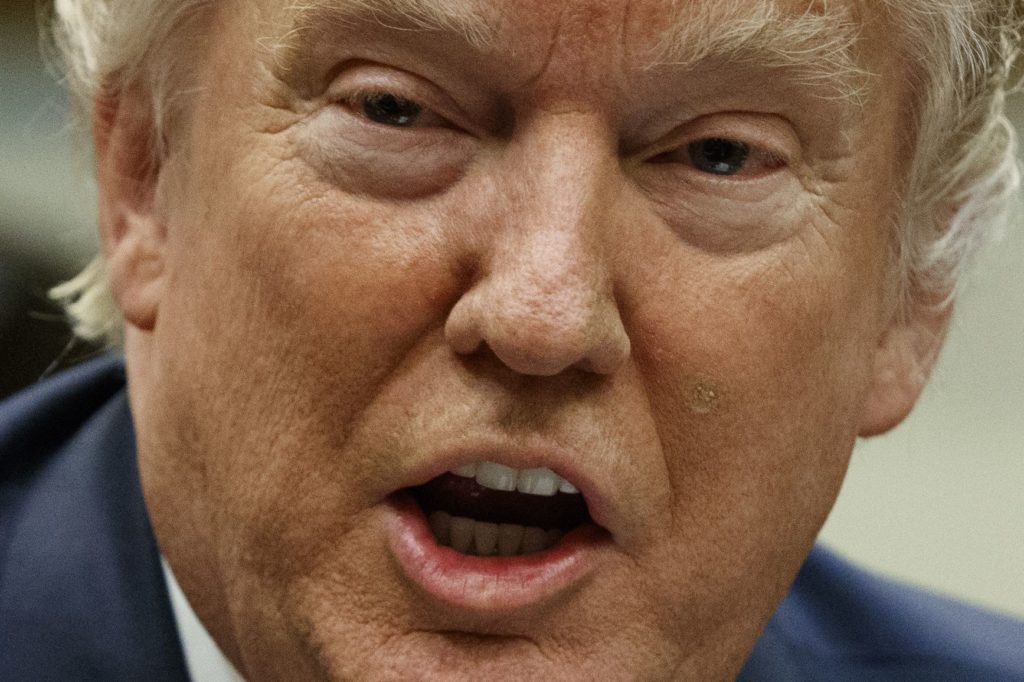
The Miami Herald columnist Leonard Pitts wrote a powerful case for Donald Trump‘s impeachment, in the style of an open letter to the “Dear Republicans in Congress,” that I was reading to my wife as she prepared breakfast the other morning. At the part where Pitts asked, “Have you no loyalties deeper than party?” Ivy broke in. “The money,” she exclaimed. That nailed it. It is always about the money. It’s about the campaign money they expect to continue bagging from the Kochs and other oligarchs who embrace the Trump agenda even as they despise the man. It’s about the money, the great gobs of money that would befall the wealthier classes, the true constituency for most of them, from the sort of tax “reform” they are counting on Trump to sign. It’s about the money they would gain for themselves from the Trump tax scheme. While the outlines he proposed are strikingly thin, they are enough to show that Congress members themselves would make out better than bank robbers. The middle class and poor would get essentially nothing. The foregone revenue would take America back to where the oligarchs want it — a sociopolitical stone age, with the new robber barons doing what they want and getting what they want, with only minimal interference, if any, from taxes, regulations or labor unions. The Congress does not simply represent the Republican Party’s true constituency. It is part of it. The most recent available figures estimated the average Congressional net worth at around $1 million. To be one of the richest 50 members required a minimum of $7.28 million in net worth. Of those 50, 32 were Republicans. There are Democrats, no doubt, who would vote for the outrageous Trump tax scheme if they thought their voters would forgive them. Most of the Republicans act as if they don’t have that particular worry. For the Democrats and the few Republicans who do care to put their country first, the question may well be whether it would be best to be rid of the guttersnipe in the White House sooner or later. From an exclusively partisan standpoint, it would suit the Democrats to have him still twisting in the ill winds of own making as the 2018 midterm elections approach. This would be better for policy as well, since every Republican Congress member who isn’t totally insulated by gerrymandering would have to worry about casting his or her vote with the extremely unpopular president. And the fact that Trump still refuses to release his tax returns, despite all the promises, raises profound suspicions about any tax legislation bearing his label. If Trump were dethroned now, whether by his Cabinet or by a late-awakening congressional conscience, the Democrats would be confronting in President Mike Pence someone who has a long-standing and genuine commitment to all the hideously anti-social policies that Trump never shared until he saw them as keys to the Republican nomination. Lacking Trump’s offensive personality, Pence could take America backward even faster and farther than Trump. The more important issues, though, are the clear and present danger of keeping an uneducated, uneducable and wildly impetuous man-child in proximity to the nuclear codes, the forfeiting of American influence and prestige for which he is responsible, and the disgust that sickens most of us with every new disclosure of his abuses of power and of the foreign influences in his campaign. Whatever happens in the short term, both political parties should be planning how to never again nominate someone so singularly unfit and dangerous as Trump. The electoral system was supposed to prevent that — “a moral certainty,” as Alexander Hamilton put it, “that the office of President will seldom fall to the lot of any man who is not in an eminent degree endowed with the requisite qualifications.” When Hamilton wrote “seldom,” he was not thinking “forever.” But the Founders provided for a day when their precautions would fail. At the outset, the party factions in Congress caucused to nominate their candidates for president. There was never a doubt as to their qualifications. No outsider cracked the system until Andrew Jackson came along, and he was much like Trump, who admires him, in being ill-informed, reckless and ruthless. Congress, for all its enormous faults, could be an inherently better judge of presidential timber than the present primary election system. But to try to give Congress control of who runs would be a fool’s errand, not to mention unwise. What Congress should do — what it must do — is to accept the constitutional responsibility the Founders assigned to it in the event of a rogue presidency. It is the fail-safe they wrote into the Constitution. As Pitts described it to the Republicans, “Your course of action, if you have even a molecule of courage, integrity or country love, should be obvious. Impeach him now.” ___ Martin Dyckman is a retired associate editor of the Tampa Bay Times. He lives in Asheville, North Carolina.

